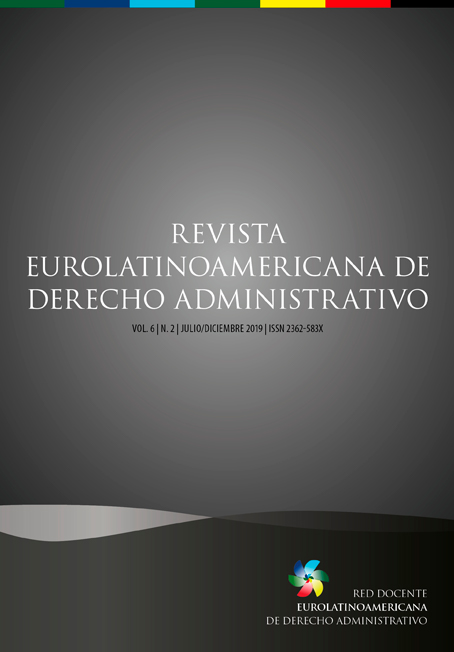Corruption in peripheral modernity under the view of the Brazilian constitutionalism
DOI:
https://doi.org/10.14409/redoeda.v6i2.8915Keywords:
modernity, corruption, constitution, functionality, asymmetriesAbstract
This work is intended to analyze the position of the (post)modern State in its fight against corruption, from the perspective of the historical development of constitutionalism, taking into account the abyssal line of modern thought, concretized in the reproduction of the enabling duality of the segmentation between central and peripheral states. Thus, a reflection is made regarding the constitution normative functionality and the structural asymmetries inherent in the non-effective implementation of fundamental rights, whose protection, under the perspective of constitutional idealism, is intrinsic to the constitution concept. Such conception leads to an analysis of the Brazilian constitution and its nominalist nature, qualified by the mismatch of reality with the fundamental rights and guarantees advocated in its text, indicating the insufficient law positivity, which makes it difficult to move towards centrality. Thus, a view of how the State perceives the corruption phenomenon is established, which is inexorably related to its position in peripheral modernity, characterized by the lack of constitution normativity and the absence of an environment enable to fulfill the fundamental rights. An analysis is made about how the constitutional order calls and instrumentalizes public institutions in order to solve the corruption problem.
References
BOBBIO, Norberto. A era dos direitos. Rio de Janeiro: Elsevier, 2004.
DA SILVA, José Afonso. Curso de direito constitucional positivo. 14. ed. São Paulo: Malheiros, 1997.
DA SILVA, Rogério Luiz Nery; MASSON, Daiane Garcia. Direitos sociais e dignidade da pessoa humana: reflexões a partir do conceito de mínimo existencial. In: ALEXY, Robert; BAEZ, Leandro Xavier; DA SILVA, Rogério Luiz Nery (org.). Dignidade humana, direitos sociais e não-positivismo inclusivo. Florianópolis: Qualis, 2015.
FORTINI, Cristiana. Corrupção e seus múltiplos enfoques jurídicos. Belo Horizonte: Fórum, 2.018.
FÓRUM ECONÔMICO MUNDIAL. The global competitiveness report 2071-2018. Disponível em <http://reports.weforum.org/global-competitiveness-index-2017-2018>. Acesso em: 24 ago. 2018.
FURTADO, Lucas Rocha. As raízes da corrupção no Brasil: estudo de casos e lições para o futuro. Belo Horizonte: Fórum, 2015.
FUX, Luiz. Jurisdição constitucional II. Belo Horizonte: Fórum, 2017.
HEINEN, Juliano. Comentários à Lei Anticorrupção: Lei n. 12.846/2013. Belo Horizonte: Fórum, 2015.
MARINELA, Fernanda; PAIVA, Fernanda; RAMALHO, Tatiany. Lei Anticorrupção: Lei n. 12.846, de 1º de agosto de 2013. São Paulo: Saraiva, 2015.
MARINONI, Luiz Guilherme; MITIDIERO, Daniel; SARLET, Ingo Wolfgang. Curso de direito constitucional. 6. ed. São Paulo: Saraiva, 2017.
MARQUES NETO, Floriano Peixoto de Azevedo. Regulação estatal e interesses públicos. São Paulo: Malheiros, 2002.
MILESKI, Helio Saul. O estado contemporâneo e a corrupção. Belo Horizonte: Fórum, 2015.
NEVES, Marcelo. Constituição e direito na modernidade periférica: uma abordagem teórica e uma interpretação do caso brasileiro. São Paulo: WMF, 2018.
PORTINARI, Natália. PIB per capita do Brasil subiria 30% sem corrupção, diz estudo do FMI. Folha de São Paulo, 2017. Disponível em: <https://www1.folha.uol.com.br/mercado/2017/10/1926931-pib-per-capita-do-brasil-subiria-30-sem-corrupcao-diz-estudo-do-fmi.shtml>. Acesso em: 23 ago. 2019.
SANTOS, Boaventura Souza. Para além do pensamento abissal: das linhas globais a uma ecologia de saberes. Revista Novos Estudos - CEBRAP, São Paulo, n. 79, p. 71-94, nov. 2007.
STRECK, Lenio Luiz. Verdade e consenso. 6. ed. São Paulo: Saraiva, 2017.
Downloads
Published
How to Cite
Issue
Section
License
Authors who publish in this Journal agree to the following terms:
- Authors retain copyright and grant the Journal of Constitutional Research the right of first publication with the article simultaneously licensed under the Creative Commons - Attribution 4.0 International which allows sharing the work with recognition of the authors and its initial publication in this Journal.
- Authors are able to take on additional contracts separately, for non-exclusive distribution of the version of the paper published in this Journal (eg.: publishing in institutional repository or as a book), with a recognition of its initial publication in this Journal.
- Authors are allowed and encouraged to publish their work online (eg.: in institutional repositories or on their personal website) at any point before or during the submission process, as it can lead to productive exchanges, as well as increase the impact and the citation of the published work (see the Effect of Open Access).



























.png)





